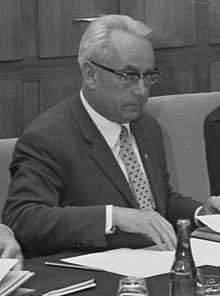Bruno Heck
From Wikipedia, the free encyclopedia
| Bruno Heck | |
|---|---|
 | |
| Heck in 1968 | |
| Federal Minister of Family Affairs and Youth | |
| In office December 13, 1962 – October 1, 1968 | |
| Preceded by | Franz-Josef Wuermeling |
| Succeeded by | Aenne Brauksiepe |
| Federal Minister of Housing and Urban Development | |
| In office November 8, 1966 – December 1, 1966 | |
| Preceded by | Ewald Bucher |
| Succeeded by | Lauritz Lauritzen |
| Personal details | |
| Born | January 20, 1917 Aalen, Germany |
| Died | September 16, 1989 (aged 72) Blaubeuren, Germany |
| Nationality | German |
| Political party | Christian Democratic Union of Germany (CDU) |

Bruno Heck 1971
Bruno Heck (January 20, 1917 in Aalen - September 16, 1989 in Blaubeuren) was a German politician of the Christian Democratic Union (CDU).
Heck was born into a poor Swabian catholic family.[1] He studied philosophy and theology at the University of Tübingen. From 1957 to 1976 Heck was a member of the German Bundestag.
Heck was Minister of Family Affairs and Youth from 1962 to 1968.[2] After the resignation of the FDP ministers in 1966, he additionally headed the Ministry of Housing and Urban Development for a short time.
Heck headed the Konrad Adenauer Foundation from 1968 to 1989.[3] The Bruno Heck Science Prize, awarded biannually by the Konrad Adenauer Foundation, was named in his honor.[4]
References
- ↑ Ein konservativer Moralist, obituary in the German newspaper Die Zeit of September 22, 1989.
- ↑ History of the Ministry of Family Affairs, Senior Citizens, Women and Youth.
- ↑ History of the Konrad Adenauer Foundation.
- ↑ Bruno Heck Science Prize at the website of the Konrad Adenauer Foundation.
| ||||||||||||||||||||||||||||
|
This article is issued from Wikipedia. The text is available under the Creative Commons Attribution/Share Alike; additional terms may apply for the media files.
